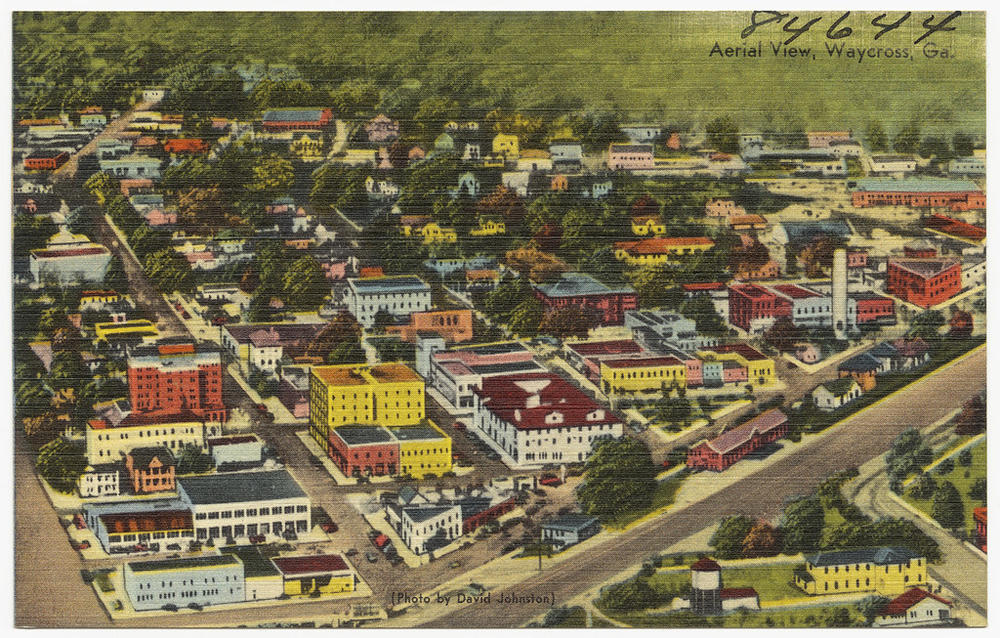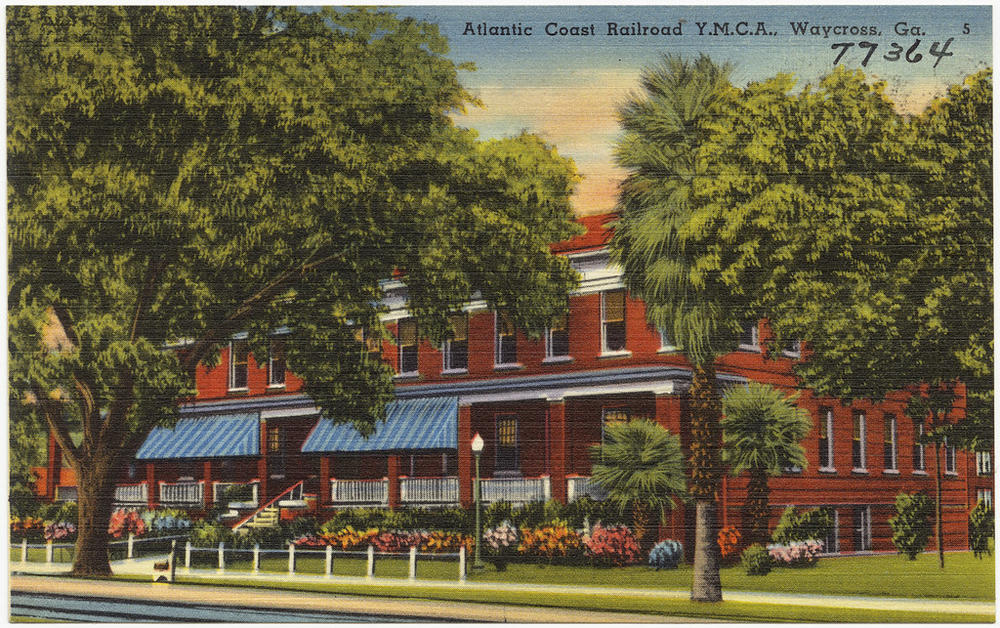Section Branding
Header Content
Amid A String Of Rare Cancers In Waycross, Residents Suspect Pollution At The Root
Primary Content
The network of rail lines and canals that gave Waycross its name now act as dividing lines for the community.
For a century, the canals carried runoff from the rail yard and other local industries. Generations of kids roamed along the banks and swam in the southeast Georgia heat. In 2015, four area children were diagnosed with rare cancers within the span of two months.
On Second Thought host Virginia Prescott speaks with Cristy Rice, Joshua Sharpe and Dana Boyd Barr.
One of the children, Lexi Crawford, died from an extremely rare cancer on Memorial Day two years ago.
Her mother, Cristy Rice, joins On Second Thought to discuss the idea that chemical contamination in the canals may have created a cancer cluster in the city.
Rice has lived across the street from a contaminated site for 15 years.
“I love my town [too], but I don’t see the problem with looking to see what’s going on,” Rice said.
A once bustling town was left behind with the introduction of I-95, a shopping mall and super stores. The town, now economically stagnated, is slowly rebuilding with a potential revival of the town. The investigation of contamination worries local officials that less people will be willing to invest or move to Waycross.
The mayor of Waycross said that he’s read every report from every investigation of polluted sites, and they were not able to confirm that the sites are the cause of diseases.
Joshua Sharpe, a journalist and Waycross native, has been investigating the story since 2016.
“[The railroad] very much is the industry that gave us life, but now people wonder if the pollution that is there could be taking lives back,” Sharpe said.
Not only could the railroad be adding to the contamination but also other facilities, like Seven Out, a water treatment company, and a city-owned landfill might be the cause of the contamination.
Sharpe and Dana Boyd Barr, a professor of exposure science and environmental health at Emory University’s Rollins School of Public Health, join On Second Thought for the discussion.
Interview highlights
On the history of the canals
Joshua Sharpe: A definitive history of the canals is actually extremely hard to come by for some reason, but some of them were put in to accommodate runoff from the railroad and other industries including the old power plant. I also spoke with the city commissioner who told me that he personally got out there back in, I think the ‘60s, with a backhoe and started digging another stretch of the canal because residents were complaining that their property was flooding. Remember this is near the Okefenokee Swamp so the land is very low lying and we're used to worrying about rising water.
On how her daughter, Lexi, was diagnosed with rare cancer rhabdomyosarcoma
Cristy Rice: She actually had started complaining of back pain. Back pain was one of the symptoms and it was the main symptom the whole time.
Within a month, a month and a half, maybe two months’ time, we had taken her several times back and forth to her primary care physician. I even changed her primary care physician to a different doctor because I didn't feel I was getting the answers and attention that I needed to get for her.
I'd been to our local emergency room I know at least 10 times within a three- or four-week period, probably more, taking her back and forth and the emergency room was telling us that she had a urinary tract infection and we would come home on antibiotics. After that was over she still had the pain.
We would go back, and they would say that she had resistance to the antibiotics and then it had moved into a full-blown kidney infection at that point, just different scenarios that way they would send her home with more antibiotics and muscle relaxers. I was even pushed off a few times, you know, maybe like she was, you know, faking her pain, or it wasn't real.
And she just kept getting worse. It kept getting worse. Finally, I went on my own and made an appointment with two different specialists: one in Douglas which was a kidney specialist and a Waycross bone and joint (doctor) to look at her back. Not even five days after I made those appointments, she had a really bad episode.
I actually had took her in the middle of the week to the emergency room and got sent back home and then that Friday night, I think it was, she had a really bad episode, had gotten sick and ended up in the floor, you know, couldn't breathe, her lips were blue. And we took her back to the emergency room and there was a different doctor we had not seen at the time actually was looking over her chart come out and took us back, ordered a CT on her and that's when they found the cancer.
On how town leaders and developers have been dealing with resident claims of a possible cancer cluster
Sharpe: I'll give you the example of the mayor, someone who's been very involved in the discussion. He told me that he's read every report that there is from every investigation of the polluted sites in town and all of the reports said that they could not confirm that they were getting people sick.
So, he takes that and he says, ‘Okay we're good. You know, we're fine.’ And he does not want people to sort of drag the town's name down is the way he put it.
He told me, you know, ‘Don't compare us to Flint, Michigan.’
What he meant by that is that there were a lot of officials in the Flint case that ended up being criminally charged with being negligent. I'd have to look and see exactly what all they were charged with. But here's mayor saying, you know, ‘We're acting in good faith. We just don't have evidence to say for sure that the contamination in Waycross is getting people sick and we don't want to drag down the city's name without evidence that it ought to be dragged.’
Virginia Prescott: Well, we did reach out to Waycross Mayor John Knox who said that according to the investigations into pollution in the town, there is no cancer cluster. We asked if he could understand why some in the community were concerned and here's what he said:
Mayor John Knox: Oh sure. I would be concerned myself if I had a child who had contracted cancer and everybody in the community is concerned, but that's a different matter entirely than knowing what is causing the situation and what to do about it.
People like me are not environmental experts and we don't have answers or know what to look for. So, we call on the state health department, the Centers for Disease Control and Prevention and all the environmental agencies and ask them to look into it, which we've done three or four times now. Every time they come back and say they can't identify the cause for these unfortunate situations. Sure, everybody is concerned about it but knowing what's causing it and what to do about it are two entirely different things.
On what occurred at some of the contaminated sites in Waycross
Sharpe: The most striking visually is the Seven Out site and what the Seven Out site was was an industrial wastewater treatment facility. What they would do is they would bring in these gigantic tanks of wastewater from various industrial customers. Their job was to clean the water to take out all of the impurities and press that into a solid form and then ship it off to the landfill.
Now, regulators say that their process routinely failed and they ended up letting contaminated water run off from their property, and because of a dispute with the city about whether or not they were doing a good enough job at cleaning up the water before they released it into the city's wastewater treatment system, the city and Seven Out agreed to cut them off at the city wastewater system.
Because of that Seven Out then left the site and they left these gigantic tanks that had polluted water in them and also somewhere along the way it just got really ramshackle. If you go there now there's still all these baby blue pipes that are just busted and littered all over the ground. There's strange muck on the pavement. You know, black and brown discoloration and there are a couple of tanks that are busted.
One of the tanks memorably says ‘permanently closed container,’ but you could put your whole head through it. It's busted open at some point somehow; we don't know exactly how. There is an old Atlanta gas light property that is contaminated. There is a city owned landfill that has environmental concerns. There are a lot of different contaminated properties.
On why a connection between contaminants and cancers in Waycross is difficult to prove
Boyd Barr: Well, here you have multiple chemicals multiple sites and then the cancers. It's hard to reconstruct what the dose or the individual exposure would be. And without having that individual exposure it's really hard to link that individual chemical to a cancer. And so, having this multi chemical kind of cocktail mixture that they're exposed to does make it difficult to isolate one chemical exposure. Maybe it's the cocktail that's the concern. I'm not quite sure.
On her fear for her other young daughters now
Prescott: Cristy, how about for you, seeing your young daughters now? Are you fearful that something could happen to them?
Rice: Yes, we are. It's very nerve wracking. Anytime one of them has a crazy symptom or, you know, even a repeated symptom, I get physically sick to my stomach. I mean it's that nerve wracking; you wonder, 'is this it' No way.
Even waiting in a doctor's office just for a checkup is nerve wracking. You know I never ever thought that one of my children would have cancer. And after going through it, the fear for the other two is strong.
Prescott: Right and I would imagine that you know the urge to know why is very big. You want to know why.
Rice: It is very much so. I don't wish or just hope that you find that there's something terribly causing the cancers and linking them to each other. We just want to know. We want to the facts. We want to know. You know we want the testing to be done. We want to know. We believe that we deserve that much. And so does everybody else that lives here.
This interview has been edited for length and clarity.
Get in touch with us.
Twitter: @OSTTalk
Facebook: OnSecondThought
Email: OnSecondThought@gpb.org
Phone: 404-500-9457




